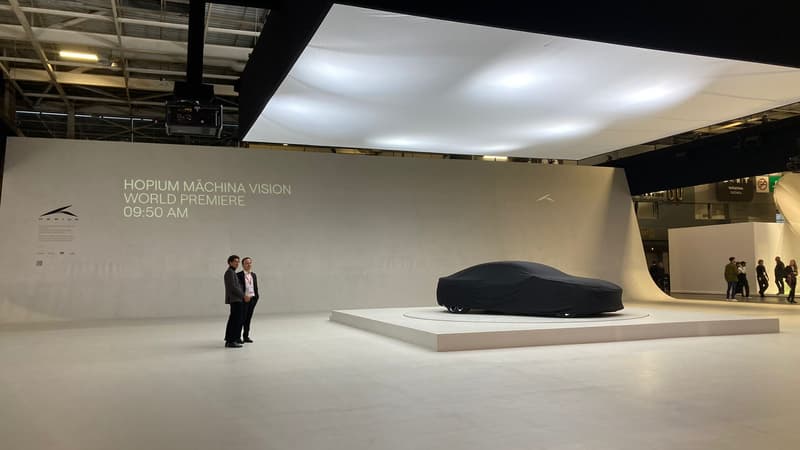The hype and cymbal presentation of the Machina Vision hydrogen sedan at the last Paris Motor Show seems distant for Hopium. The French start-up announced its suspension of payments on Friday as it faces significant financial difficulties. The Paris Commercial Court has opened “a receivership proceeding for an initial period of 6 months (until January 19, 2024), possibly renewable for 6 months,” the company said in a press release.
Consequently, the company’s trading was suspended on Thursday, when the shares were worth 90 cents, a drop of more than 87% since the beginning of the year. It resumed on Friday, and at 1:30 p.m., the price was down another 40% from the previous day, with a share no longer worth 54 cents.
In a second press release published Friday, the start-up announced that it had found a way to finance itself through Atlas Special Opportunities.
Often presented in the media as a “French Tesla”, due to the emphasis placed on innovation and high-end, Hopium ultimately finds itself against the wall. However, in recent months, several signs could suggest that the company’s development would face significant obstacles of various kinds.
Management waltz and low cash
On October 22, one day before the closing of the Paris Motor Show, Hopium announced a major partnership with CA Consumer Finance, the consumer credit subsidiary of Crédit Agricole. This collaboration provided for the delivery of 10,000 Machina sedans for an order valued at 1,200 million euros. Something that reassures about the launch of the production of hydrogen cars with a horizon: from 2025 in a future factory located near Vernon, in Normandy.
Then the euphoria quickly subsided. As of last January, a net loss of close to 10 million euros is mentioned in the first half of 2022, compared to half a year earlier, with a cash flow that had been reduced to 20,000 euros at the end of June.
The newspaper the echoes it also reports delays in the payment of wages during the fall and dishonest payments against suppliers. Hopium then announces that it is raffling off a second tranche of 200 bonds convertible into shares with a face value of 10,000 euros each, within the framework of the agreement signed with the company Atlas Special Opportunities.
The financial difficulties also have consequences in the reorganization of the teams with the departure of 35 employees due to termination of the collective contract. As for the organization chart, Sylvain Laurent is appointed Managing Director while Philippe Baudillon arrives as Deputy Managing Director. For his part, Olivier Lombard becomes the deputy general manager in charge of the product, six months after he handed over his position at the head of the board of directors to former Transport Minister Jean-Baptiste Djebbari … who will leave him same boat two months later.
The economic context, the only culprit?
To explain this slump, Hopium invokes the economic context that worries most car manufacturers around the world. “There are resources and components whose prices are rising and that have an impact on our purchases,” an executive from the start-up explained to us in January. “We are still a vehicle fuel cell (Editor’s note: fuel cell), but we have the same problems that all car manufacturers face with regard to electronic components and certain raw materials.”
But the start-up’s financial difficulties are also due to its core business: hydrogen, a technology still in its embryonic state despite recent strong government announcements to develop it on an industrial scale in the coming years.
Experts and industrialists remain divided on the place of hydrogen in the decarbonisation of the automotive sector. Toyota or BMW place great hopes on it, while many other brands reserve it for utility vehicles, which are more difficult to convert to electric. The commitment to a high-end hydrogen car seemed, therefore, especially ambitious when the daily uses around hydrogen have yet to be developed in the automotive field, if only through the installation of a network of points of recharge.
The abandoned car in favor of the fuel cell
For this reason, at the beginning of spring, Hopium decided to put its hydrogen sedan project on hold to reorganize itself around two poles: on the one hand, Hopium Technologies to develop its fuel cell technology for new industrial markets such as aeronautics, the railway or the maritime; and on the other hand Hopium Automotive dedicated to the development of consumer hydrogen vehicles.
Nearly echoes, Sylvain Laurent then mentions contacts with CMA CGM as well as new players in the airline industry and thus hopes to sell these fuel cells “perhaps in markets with less volumes but more important in terms of values”. Now in the testing phase, the fuel cells will benefit from the completion of the Normandy plant before the end of the year to be marketed from 2024, with the first deliveries scheduled for 2025.
For the company, it is now essential to generate substantial income to stay afloat after the publication in early May of the poor results for the 2022 financial year. Last year, its losses thus amounted to 23.9 million euros -compared to 8 million in 2021-, linked in particular to the hiring of 116 new employees, according to the company. Despite several capital increases last year for a total of 4.1 million euros, the company registered negative own funds as of December 31, 2022 (-10.4 million euros) and cash was also in the red, with -1.3 million euros.
Alors que plus aucune date n’est aujourd’hui avancée pour la sortie de la berline Machina, la start-up française doit réussir à conclude “un ou plusieurs accords industriels ou financiers avec des partenaires capables d’accompagner Hopium dans une vision de moyen /Long-term”. It also has a “grant under the France 2030 ‘Auto Invest’ call for projects” to raise additional funds.
Source: BFM TV


